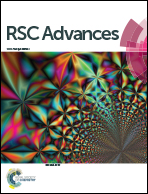Relationship between measurement conditions and energy levels in the organic dyes used in dye-sensitized solar cells†
Abstract
The energy levels of new metal-free organic dyes for dye-sensitized solar cells have been investigated by the photoemission in air, UV-Vis absorption and cyclic voltammetry methods in the solutions of the dye molecules, in films of the pure dyes and in the dyes adsorbed on nanoporous TiO2. Significant differences of the energy levels have been found depending on the dye environment. For the best level of tuning in a solar cell, the energy levels are to be determined for the dyes adsorbed on the TiO2 surface. The absorbed photon conversion to current efficiency (APCE) of the solar cells was evaluated and compared with the incident photon quantum efficiency (IPCE). The results obtained show that the IPCE is dependent on the light quanta energy and reaches a maximum value when the light quanta energy is about 0.3 eV higher than the light absorption threshold.


 Please wait while we load your content...
Please wait while we load your content...